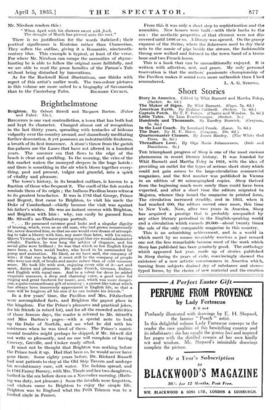Brighthelnistone
BRIGFITON is one vast contradiction, a town that has both lost
and kept its character. Changed almost out of recognition in the last thirty years, spreading with tentacles of hideous vulgarity over the country around, and shamelessly meditating further desecration, it yet possesses an indestructible freshness, a breath of its first innocence. A stone's throw from the garish
fun-palaces are the Lanes that have not altered in a hundred years. The summer sea that flows to the edge of the
beach is clear and sparkling. In the morning, the cries of the fish market waken the moneyed sleepers in the huge hotels : and there is something in the air which blows together every- thing, past and present, vulgar and graceful, into a spirit of vitality and pleasure.
The town's history, in its broadest outlines, is known to a fraction of those who frequent it. The smell of the fish market reminds them of its origin ; the bulbous Pavilion bears witness to its greatest benefactor. It was in 1783 that George, Prince and Regent, first came to Brighton, to visit his uncle the Duke of Cumberland—chiefly because the visit was against his father's wishes. He was an instant success with Brighton, and Brighton with him : why, can easily be guessed from Mr. Sitwell's un-Thack erayan portrait.
" . . . He possessed extreme good looks and a singular dignity of bearing, which, even as an old man, who had grown monstrously fat, never deserted him, so that no one would over dream of attempt- ing to take a liberty with him, any more than later, with his niece, Queen Victoria, or the same piercing royal-blue eye would administer rebuke. Further, he was long the arbiter of elegance, and his social gifts were brilliant : he was that which so few English kings nave been, a born social leader, who loved to be surrounded by pomp and animation. He liked, as we have said, the company of wits ; if that was lacking, it must still be the company of people who were not dull, of freaks and zanies rather than of cold common sense. He took life with zest, enjoying every side of it—art and sport, duties and pleasures. He spoke French, German, Italian, and English with equal ease. And to a talent for dress he added exquisite manners, a deep and charming voice, a good voice for singing and great fondness for music, and, which was more danger- ous, a quite extraordinary gift of mimicry ; a parrot-like talent which has always been immensely appreciated in English life, so that a man will be forgiven all his sins if he can imitate his friends."
In a few years' time, the Pavilion and Mrs. Fitzherbert were accomplished facts, and Brighton the gayest place in the kingdom. For the Prince's pleasures and practical jokes, for his friends (a mixed lot), and for all the crowded activities of those famous days, the reader is referred to Mr. Sitwell's and Miss Barton's pages—with a special note to look up the Duke of Norfolk, and see what he did with his mistresses when he was tired of them. The Prince's matri- monial troubles might perhaps be skipped, if Mr. Sitwell did not write so pleasantly, and no one will complain of having Creevey, Greville, and Croker ready sifted.
It must not be thought that Brighton was nothing before the Prince took it up. Had that been so, he would never have gone there. Some eighty years before, Dr. Richard Russell
had sent patients to stay at the Old Ship Tavern and undergo his revolutionary cure, salt water. The fashion spread, and in 1782 Fanny Burney, with Mrs. Thrale and her two daughters, bathed in the sea before dawn on a November morning. (Bath- ing was duty, not pleasure.) Soon the invalids were forgotten, and visitors came to Brighton to enjoy the simple life. Brighton was to England what the Petit Trianon was to a limited circle in France. From this it was only a short step to sophistication and the amenities. New houses were built—with their backs to the sea : the aesthetic properties of that element were not dis- covered until 1806 or so. A library was opened. On the grassy expanse of the Steine, where the fishermen used to dry their nets to the music of pigs beside the stream, the fashionable throng now walked and listened to the town band of a trom- bone and two French horns.
This is a book that can be unconditionally enjoyed. It is written with affection, zest, and grace. My only personal reservation is that the authors' passionate championship of the Pavilion makes it sound even more outlandish than I had










































 Previous page
Previous page